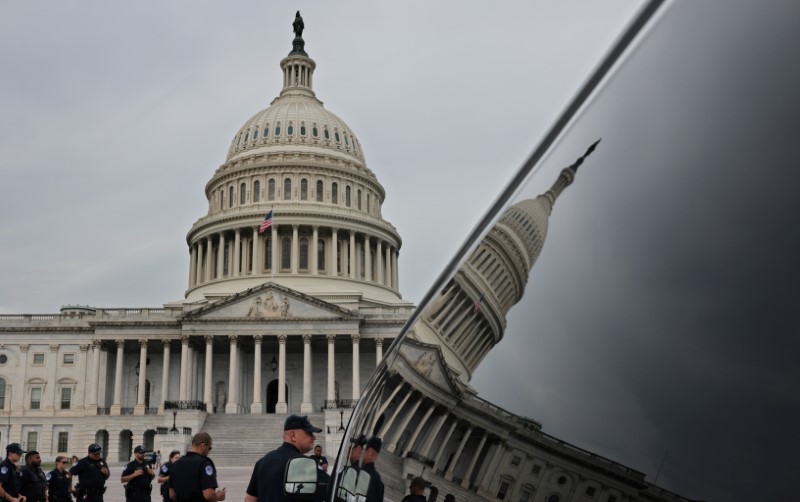
By Andrew Chung and Gabriella Borter
(Reuters) -A Texas ban on abortions after six weeks of pregnancy took effect on Wednesday after the U.S. Supreme Court did not act on a request by abortion rights groups to block the law, which would prohibit the vast majority of abortions in the state.
Abortion providers worked until almost the midnight deadline, when the court’s inaction allowed the most restrictive ban in the country to be enforced while litigation continues in the groups’ lawsuit challenging its constitutionality.
The law amounts to a near-total ban on abortion procedures given that 85% to 90% of abortions occur after six weeks of pregnancy, and would likely force many clinics to close, the groups said.
Such a ban has never been permitted in any state since the Supreme Court decided Roe v. Wade, the landmark ruling that legalized abortion nationwide, in 1973, they said.
At Whole Women’s Health in Fort Worth, clinic staff worked up to midnight, serving 25 patients in the 2-1/2 hours before the deadline, said spokeswoman Jackie Dilworth.
The national group said its Texas locations, also including Austin and McKinney, remained open on Wednesday.
“We are providing all abortion medication and abortion procedures, but as long as the patient has no embryonic or fetal cardiac activity,” Dilworth said. “Our doors are still open, and we’re doing everything we can to come within the law but still provide abortion care to those who need us.”
Planned Parenthood and other women’s health providers, doctors and clergy members challenged the law in federal court in Austin in July, contending it violated the constitutional right to an abortion.
The law, signed on May 19, is unusual in that it gives private citizens the power to enforce it by enabling them to sue abortion providers and anyone who “aids or abets” an abortion after six weeks. Citizens who win such lawsuits would be entitled to at least $10,000.
Abortion providers say the law could lead to hundreds of costly lawsuits that would be logistically difficult to defend.
In a legal filing, Texas officials told the justices to reject the abortion providers’ request, saying the law “may never be enforced against them by anyone.”
“Texas Right to Life is thankful that the Texas Heartbeat Act is now in effect. We are now the first state ever to enforce a heartbeat law. We still await word from SCOTUS,” spokeswoman Kimberlyn Schwartz said in a statement, using an acronym for Supreme Court of the United States.
‘ALL-OUT EFFORT’
Democratic U.S. House of Representatives Speaker Nancy Pelosi blasted the Texas move.
“This radical law is an all-out effort to erase the rights and protections of Roe v Wade,” Pelosi wrote on Twitter. Using the legislation’s number, she added, “we will fight SB8 and all immoral and dangerous attacks on women’s health and freedoms with all our strength.”
A court could still put the ban on hold, and no court has yet ruled on its constitutionality, Stephen Vladeck, a professor at the University of Texas at Austin School of Law, wrote in a tweet.
“Despite what some will say, this isn’t the ‘end’ of Roe,” he wrote.
Texas is among a dozen mostly Republican-led states that have enacted “heartbeat” abortion bans, which outlaw the procedure once the rhythmic contracting of fetal cardiac tissue can be detected, often at six weeks – sometimes before a woman realizes she is pregnant.
Courts have blocked such bans.
The state of Mississippi has asked the Supreme Court to overturn Roe v. Wade in a major case the justices agreed to hear over a 2018 law banning abortion after 15 weeks.
The justices will hear arguments in their next term, which begins in October, with a ruling due by the end of June 2022.
The Texas challenge seeks to prevent judges, county clerks and other state entities from enforcing the law.
A federal judge rejected a bid to dismiss the case, prompting an immediate appeal to the New Orleans, Louisiana-based 5th U.S. Circuit Court of Appeals, which halted further proceedings.
On Sunday, the 5th Circuit denied a request by the abortion providers to block the law pending the appeal. The providers then asked the Supreme Court for an emergency ruling.
(Reporting by Andrew Chung in New York and Gabriella Borter in Washington; Editing by Scott Malone, Gerry Doyle and Jonathan Oatis)












